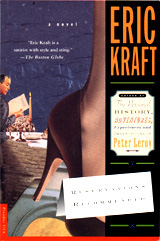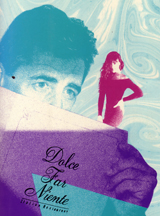
YOU CAN READ
|
They are shown to a table beside the glass-covered portion of wall. As soon as they sit down, Gwen takes a look around the room and sends up a wailing complaint: “Oh, everyone here is so young.” So much for the possibility that it might not be so bad, thinks Belinda, but she’s grateful to Gwen for not actually bursting into tears or thumping her breast. Matthew can’t keep himself from surveying the other diners to see whether Gwen is right. He’s pleased to find that, with the exception of a child of six or so at the next table who has just knocked his water glass over, they don’t seem so terribly young to him. Harold and Gwen must be about ten years older than he and Belinda, he decides. “Do you realize how much effort has gone into making this place look like a wreck?” he says. “Oh?” says Harold, as if he hadn’t noticed. “I hadn’t noticed.” He looks around. “Reminds me of my childhood home,” he claims. Matthew gives him a chuckle, as a gift. He wonders how much truth there is behind the remark. At the office, Harold—what is his name?—always conducts himself as if he comes from wealth, his manner a pretense to upper-class disdain, but the truth is widely known: he’s the son of immigrant parents who are still living, still speaking with embarrassing accents. Matthew has marveled that Harold apparently doesn’t realize that everyone recognizes that he’s only an aspirant to the genuine article, merely a snob. “Oh. Look at that,” says Matthew. “I hadn’t noticed the leak stains over there. See? On the ceiling? They’re probably painted on, aren’t they? Trompe l’oeil leaks. They really look kind of attractive, the way they spread out that way.” “Like a topographic map,” suggests Harold, after a moment’s hesitation. “Yes!” says Matthew. “And then the way they continue down the wall in sort of graceful waves.” “Like high-water marks along the shore,” Harold offers, following a period of desperate invention. “Mm-hm,” says Matthew. “Or the folds of Belinda’s—ah—neckline,” says Harold, responding to a genuine flash of inspiration. Having mentioned it, he seizes the opportunity he’s given himself to glance down it, smiling as he does so a satisfied, oleaginous smile. “Very good, Harold,” says Matthew. “He could be a writer,” says Gwen. “I keep telling him he should write a book.” “You know,” says Matthew, quite deliberately ignoring Gwen’s remark, “this whole place gives me reason to take heart. You see,” he says, addressing Harold and Gwen, “my apartment has a mysterious—odor.” He tells the whole story, but this time there’s a different quality to his telling. Under the influence of this setting, his trial has become a story. “So you see,” he says after telling it, “this place has given me an idea. I’ve been looking at this problem in the wrong way. My thinking has been all wrong.” He smacks himself on the forehead. “I’ve been thinking that I have to fix the place up when they finally get rid of the smell. I thought I had to bring it back to the condition it was in when I moved in. Make it brand new again. But now that I look around here, I see I don’t have to do that at all.” “Ah-ha!” says Harold. “Here you have an entirely new aesthetic.” “Exactly.” “L’esthétique du mal,” says Belinda. “Very good,” says Harold. “And if you embrace this esthétique du mal, it will save you a great deal of trouble and expense.” “You bet. Why repair the damage? I could just put some clear plastic over the hole in the wall—” “Why bother?” “Right. Why bother? Glue the old pieces of carpet back in place.” “Forget it. Leave the pad exposed.” “Good. Good. Very good.” Matthew takes another look around, on the lookout for decorating tips. Something is missing, something that would be the perfect touch: one of the writings of the Neat Graffitist. What would fit here? He’ll have to look through his collection and see, but here’s a possibility, selected from the writings Matthew has copied into his notebook: ON SATURDAY, I WAS EATING SOME CHICKEN HERE, AT THIS SPOT, AND IT WAS PRETTY GOOD, BUT I GOT A BITTER TASTE IN MY MOUTH AND IT SPOILED EVERYTHING. THIS IS HOW IT IS.A busgirl arrives at the table and deposits an earthenware vase, in which there is an arrangement of a single calla lily and a number of lengths of a skinny, twisted bread of a kind unfamiliar to all but one of our happy quartet. At the table next to them, the boy who spilled his water is now banging one of these loaves on the table. “So what have we here?” asks Harold. “My God,” says Matthew. He pulls a length of bread from the vase. “Do these remind you of anything?” “DNA?” suggests Gwen. She takes one. “Oh, no, no,” says Harold, working, straining, yearning to be funny. “Some kind of flora from Venus.” Gwen wonders, as she has so many times before, why Harold feels this need to be amusing. It isn’t in his nature. He’s a serious man. He’d be much more successful in the company of others if he were content to be a serious man. It seems to her that if he would only admit to himself what he is, and work at being that, he could be regarded almost as a sage, but instead he wants to be a clown. Why should that be? Is it this Belinda now, tonight, making him act the fool? She’s so young! Those breasts! That dress! And the nerve, the wonderful nerve, just having the nerve to wear her hair that crazy way. Gwen finds that she can’t envy Belinda. She likes her. Gwen laughs at Harold’s feeble joke and wonders again why she laughs, why she has stayed with him so long, too long, so that it seems too late now to leave. “No,” says Matthew. “That’s not it. This bread is just like the stuff we made in the Boy Scouts, or I should say tried to make in the Boy Scouts. Bread baked on a stick? Weren’t you in the Boy Scouts, Harold?” “No. I went to a camp every summer, but I wasn’t in the Boy Scouts.” He’s lying; there was never enough money in his family to send him to camp. Of course not, Matthew thinks. How could I have been so stupid? The Boy Scouts would be too plebeian for you to admit to. “Well,” says Matthew, “one of the things a good Scout attempted to cook over an open fire was bread-on-a-stick. Or—wait a minute—maybe it was biscuits-on-a-stick. Whichever it was, you stripped the bark from a stick, and then you dried it out, I guess.” Right here, at this moment, just as he’s beginning to describe the making of bread-on-a-stick, Matthew is struck by his strongest memory of Boy Scout camp. It isn’t bread-on-a-stick; it’s the memory of standing in a group of a dozen or more boys, in a hot canvas tent, watching one of the younger campers give a blow job to one of the older ones. Now and then, when Matthew recalls one memory or another from that period of his life, this memory pops up as well. He reacts to the memory exactly as he reacted to the original experience, with disgust and fascination. Witnessing this act was his first experience of sex between a couple, his only other experience having been solo experiments in his bedroom, at night while his mother sat up alone, in the tiny living room, just a door away, watching television. “You made the batter,” he says, “or the dough. I wish I could remember whether it was bread or biscuits. Maybe there were ways to do both. Anyway, you made the dough, let’s say, and then you stretched it out—no, no—you rolled it out, like clay when you were making those bowls in grammar school. And then you wrapped it around the stick. Then you held the stick over the fire, and in a remarkably short time the dough became hard and black and tough as rope.” This is a success. Belinda and Gwen laugh. However, Harold feels that he must be more amusing, that he must take Matthew’s success and build a greater one on top of it. He says, “Those were the precise instructions in the Scout manual, I imagine? ‘Wrap dough around stick. Hold over fire. Cook until hard and black and tough as rope.’” “Right,” says Matthew. He chuckles. He breaks a piece from the bread and tries it. It’s quite delicious. “Mmm,” he says. “This is great. I wonder if this is the way it was supposed to come out in the Boy Scouts?” “How do you think they make it here?” asks Gwen. “They probably have Italian Boy Scouts in the kitchen, baking over an open fire,” suggests Harold. A waiter arrives to see if they want more drinks, and Gwen asks, “How do you make this bread?” “The dough is wrapped around a stick—” the waiter begins. Everyone bursts out laughing, except Matthew, who holds himself back because he doesn’t want the waiter to feel that he’s being insulted. He shrugs for the waiter’s benefit, implying that his friends are hysterical or drunk. At least the waiter will know that the guy who brought the woman in the white mink isn’t the kind of guy who makes jokes at the expense of waiters. “—and then they bake it,” says the waiter, pushing right on. It might seem that he’s cloaking himself in the thinnest of dignities—overlooking what would otherwise vex him—but in fact it is the true dignity of the superior and self-possessed. This fellow is an Italian graduate student, studying physics at MIT, where he’s near the top of his class. He is a cousin of the owner of this restaurant and pitches in now and then when a waiter doesn’t show up for work. He likes the work, on the whole, and treats his waiting as a performance, but he has never enjoyed a night at the restaurant as much as this one, for he’s quite smitten with Belinda. “Over an open fire?” asks Harold. “No, in a brick oven,” says the waiter, smiling but cool. “Tonight it came out very well, I think.” He pauses just an instant. “Usually it’s hard and black. And tiglioso. Like a fune.” They are startled but recover quickly, Harold first. “Fune,” he says. “Rope,” as if he knew. “Roper,” Matthew mutters involuntarily, recalling Harold’s name at last. |
 |
||
|
RESERVATIONS
RECOMMENDED | CHAPTER 3, PART 4 | CONTENTS
PAGE
|

 Here
are a couple of swell ideas from Eric Kraft's vivacious publicist, Candi
Lee Manning:
Here
are a couple of swell ideas from Eric Kraft's vivacious publicist, Candi
Lee Manning:
